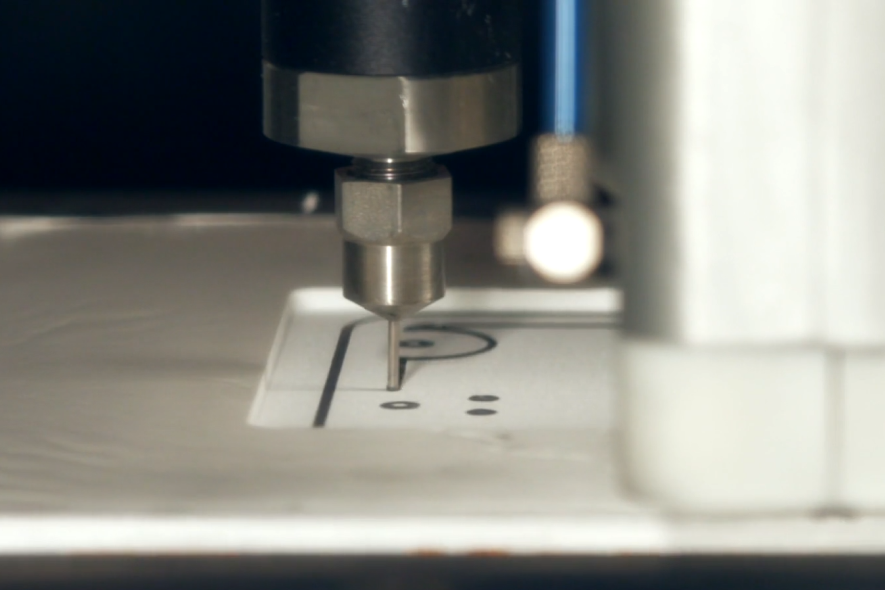Mantle is the only metal 3D printing technology designed specifically for precision tooling. This means printing tools with the accuracy, surface finish, and tool steel properties required for demanding tooling applications. This also means that Mantle was designed to fit seamlessly into your existing facility without requiring extensive modifications or safety precautions. This post outlines the specific features of Mantle printing technology, which enables tool rooms to deploy Mantle’s breakthrough 3D printing system easily.
EASE OF INSTALLATION: MANTLE’S PROMISE TO YOU
Recognizing tool shops’ unique challenges and demands, Mantle made very specific decisions to simplify system installation, eliminate hazards, and minimize learning curves.

Mantle’s metal 3D printing system is designed specifically to go on your shop floor
HERE’S HOW MANTLE IS DESIGNED FOR YOUR SHOP FLOOR
1. NO LOOSE METAL POWDER
Unlike many other metal 3D printing technologies, Mantle’s systems do not use loose metal powders, which can pose inhalation risks and require extensive PPE like respirators. In addition, if dispersed in the air, fine metal powders can pose explosion hazards. Mantle’s paste material, by comparison, combines metal particles with liquid solvents and is packaged in cartridges, eliminating the risks associated with loose powders. All waste from Mantle’s process is automatically filtered and deposited into a standalone enclosure for easy disposal.

Mantle’s technology does not expose users to loose metal powders. Mantle’s tool steels come in cartridges of paste.
2. NO SOLVENT DEBINDING
Say goodbye to the lengthy and often hazardous solvent debinding process. With Mantle, parts go from the printer straight into the sintering furnace, so there is no need to worry about the hazards of a solvent debind step, significantly reducing the time needed to go from design to finished metal part.
3. STANDARD SHOP POWER AND AIR
No need for fancy or proprietary power setups. Mantle runs on what tool shops already have in place for their existing CNC equipment.
- Printer: 208 VAC 50A 3-phase power
- Furnace: 208 VAC 70A single-phase power
4. NO PROGRAMMING REQUIRED
Mantle’s software takes the guesswork out of printing, ensuring you get high-quality, usable tools with minimal effort. No programming is required to create toolpaths, as Mantle’s software generates all toolpaths automatically. Unlike other metal 3D printing technologies and CNC CAM software that take years to learn, users can be trained on Mantle’s equipment in just hours.

Mantle’s software automates all toolpaths, removing the time consuming and costly CAM step from a toolbuild
5. NO LASERS
Mantle’s technology combines the most popular method of 3D printing (material extrusion) with tried and tested CNC machining to produce high-quality parts without the complexities and hazards of having a high-power laser in your shop.
6. NO SPECIAL ROOM REQUIREMENTS
Mantle machines sit right on your shop floor next to your existing toolmaking equipment – no need for a specialized environment or explosion-proof rooms commonly required with other powder metal 3D printing systems.
7. EASY-TO-USE FURNACE
Not all toolrooms are familiar with sintering, so Mantle designed a low-cost furnace that is easy to operate and maintain. Users simply select from a pre-programmed list of sintering profiles and hit start; the furnace takes just minutes to start and runs hands-free from there.

Mantle’s sinter furnace is easy to use, allowing users to start a run in just minutes
8. NO EXPENSIVE GASES
Many other sintering furnaces require argon to create an inert, clean sinter environment. Mantle’s furnace is designed to use nitrogen, which is much less expensive and often already present in shops for welding operations.
9. COST-EFFECTIVE
With the reduced need for specialized equipment, rooms, and training, the overall cost to integrate Mantle into your shop floor is surprisingly low, especially given the low cost of Mantle’s equipment – $230,000 for the printer and $120,000 for the furnace.
CONCLUSION
In today’s competitive tooling market, every advantage counts. Mantle offers toolmakers an unparalleled list of benefits, enabling the production of precision tooling with minimal user interaction at lower cost and in less time than traditional methods. In addition, Mantle technology makes it easy to incorporate conformal cooling channels into tools. Unlike other metal 3D printing technologies, Mantle is simple to install on your shop floor and does not require extensive facility modifications.

